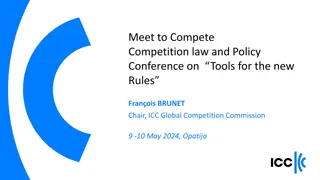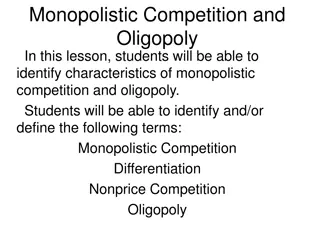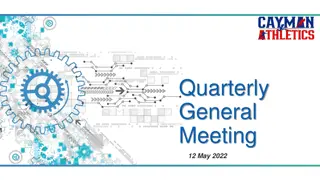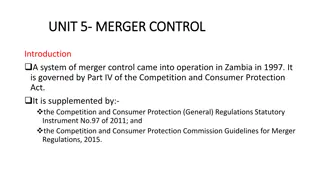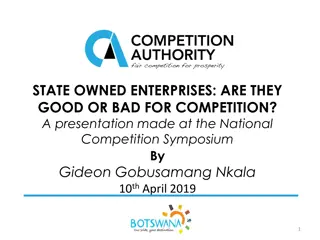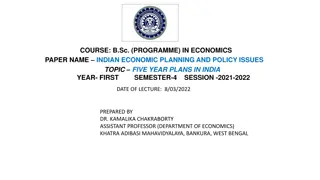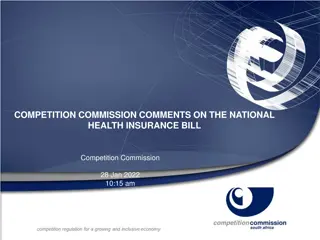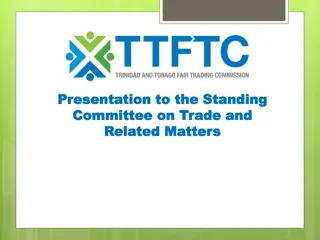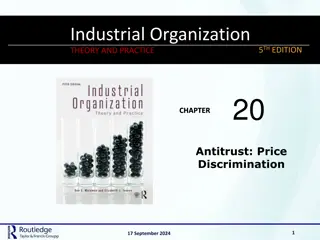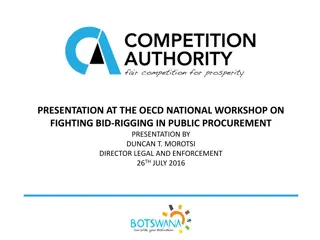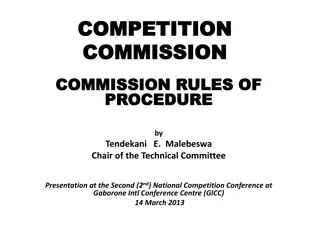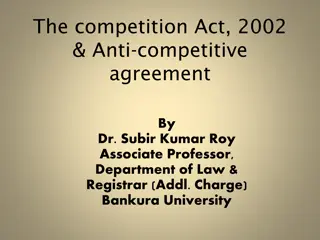Evolution and Strategy Planning at Namibian Competition Commission
The evolution and strategic planning of the Namibian Competition Commission are highlighted, focusing on organizational structure, operational strategies, and stakeholder orientation. From the early formative years to the current fully-fledged status, the Commission's commitment to effective enforcement and market competition is emphasized through a framework of goals, objectives, and outcomes.
Download Presentation

Please find below an Image/Link to download the presentation.
The content on the website is provided AS IS for your information and personal use only. It may not be sold, licensed, or shared on other websites without obtaining consent from the author.If you encounter any issues during the download, it is possible that the publisher has removed the file from their server.
You are allowed to download the files provided on this website for personal or commercial use, subject to the condition that they are used lawfully. All files are the property of their respective owners.
The content on the website is provided AS IS for your information and personal use only. It may not be sold, licensed, or shared on other websites without obtaining consent from the author.
E N D
Presentation Transcript
ICN Agency Effectiveness workshop Mr. Mihe Heinrich Gaomab II Chief Executive Officer Gaborone, Botswana 10 - 11 March 2016
Introduction The Namibian Competition Commission was formally established on the 9th December 2009 The early years were formative, involving the setting up of the institution, clarifying procedures and building up the institution To date, It is a fully-fledged institution with over 30 staff complements The Commission s operations and execution is guided by the 5 year strategic plan First generation : 2009/10 to 2013/14 Second generation: 2014/15 to 2019/20
Organizational structure Board Office of the Chief Executive Officer Corporate Services Division Mergers and Acquisition Restrictive Business Practices Economics and Sector Research
Strategy Evolution Continuity and Change 1st Generation Strategy 2nd Generation Strategy Operationalise compliance Research and development Stakeholder partnering and relationships Building and developing organisational capacity and capability to realise mandate To ensure effective enforcement of the Competition Act as a contribution to creating competitive markets in line with Vision 2030 To expand the scope of competition regulation and strengthen the quality thereof To enhance competition advocacy towards the fulfilment of sound competition principles and practices To conduct action oriented research on competition in support of evidence-based competition regulation and policy To develop the Commission as a centre of operational excellence in competition regulation
Overview of the Strategic Planning Framework and Process Stakeholder Orientation National Outcomes Hierarchy of Performance National Outcomes to which NACC Contribute Logic Model Impact Indicators Development Impact Achieved Policy Goals Mission and Mandate Outcome Indicators Outcomes Realised Strategic Goals Goals Output Indicators Outputs Delivered Measurable Objectives Objectives (Division) Operational/ Divisional Plans Activity Indicators Activities Implemented Operational Plans Input Indicators Activity Plans Activity Plans Inputs Utilised
Strategy Map 2015- 2010 Mission: To safeguard and promote competition in the Namibian market Vision: Fair market competition Values: National economic interests comes first Impartiality Consistency Accountability for our role Integrity Strategic Goals To ensure effective enforcement of the Competition Act as a contribution to creating competitive markets in line with Vision 2030 To expand the scope of competition regulation and strengthen the quality thereof To enhance competition advocacy towards the fulfilment of sound competition principles and practices To conduct action oriented research on competition in support of evidence-based competition regulation and policy To develop the Commission as a centre of operational excellence in competition regulation Outcomes 1. Increased compliance with the provisions of the Competition Act Competition policy developed and submitted to MITSD Draft Competition Bill submitted to MITSD Culture of compliance to the Competition Act established Established a knowledge-base on competition in the Namibian economy Established the Commission as a centre of operational excellence in competition regulation 1. 2. 2. 3. 4. 3. 5. 4. 6. 5.
Monitoring, Evaluation and Reporting Strategise Strategise Implement Implement Monitor Adjust Adjust
A Note on the Life Cycle of a Competition Agency According to UNCTAD, a competition agency follows different stages in its life cycle Stage I: Stage II: Stage IV: Stage III: Institutional building: setting up office, recruiting staff, ICT, preparing the budget, etc. Advocacy, sector studies, enquiries and focus on non- complex cases Training and knowledge management Investigation of complex cases Hi standards of complex cases and cooperation in enforcement High profile advocacy strategy to raise awareness of the benefits of competition in the market UNCTAD. (2013). Prioritization and resource allocation as a tool for agency effectiveness. Intergovernmental Group of Experts on Competition Law and Policy Thirteenth Session Geneva, 8 12 July 2013. Retrieved July 23, 2015, from http://unctad.org/meetings/en/SessionalDocuments/ciclpd20_en.pdf.
A Note on the Organisational Life Cycle According to organisational theorists all organisations pass through predictable stages of growth, and their strategies and structures and activities correspond with the stage of growth Renewal Maturity Growth Decline Growth Early Development Inception Time
Current situation The developmental status of the NaCC lies between Stage II and III The Commission has seen considerable progress in enforcement, with finalisations of investigations with contraventions, in the glass, agro processing and the health industries. Considerable number of mergers and acquisitions cases have been handled since establishment (over 350 cases). A number of market studies has been undertaken in the retail, cement, poultry and the automotive industries. Stakeholder engagement and advocacy through workshops, media and trade fairs Since establishment the Commission has been active in the building and development of the organizational capacity Conclusions of MoUs with sector regulators and the CCSA Review of the competition Act Finalization of the Competition Policy Under the 2015 2020 Strategic plan, the Commission has earmarked advocacy as a strategic goal towards the fulfilment of sound competition principles and practices.
Situational Analysis External Issues Opportunities Threats Changes to the act will lead to changes in powers and functions Important to ensure that competition regime is strengthened Important to balance international standards against national relevance Use the review of the Act to strengthen the mandate, powers and function of the Commission Provide greater clarity on matters of legal uncertainty Influence the substance of the legal review Review of the Competition Act Changing the structure of the economy (narrow, shallow) Sectoral targeted approach Infant Industry Protection (IIP) State-led development in terms of the role of SOEs Commitments to international and regional economic bodies (SACU, SADC, WTO) and EPAs Investment Bill (ownership) Greater public awareness leads to more complaints by the public, and further to increase in workload Public also demands greater impact by the Commission Embed competition concerns in the implementation of industrial policy, e.g. in the design of the IIP Competition policy goals and the competition regime can be undermined in the process of state-led economic development (monopolies) Economic policy development and implementation Educate the public on the role of the Commission Interact with public as a critical stakeholder grouping and develop favourable public sentiment Increasing public awareness of the role of the Commission
Situational Analysis External Issues Opportunities Threats Commission need to consult with other regulators in regulated sectors Need for cooperation to effectively regulate competition in regulated sectors Already commenced with establishing working relationships the MoA Address competition concerns in regulated sectors and network industries through close collaboration with other economic regulators Overlapping jurisdiction with regulators
Situational Analysis Strengths Internal Issues Weaknesses Need to develop graduate recruitment programme to develop skills Focus on skills for middle and senior analysts and legal professionals Require economic analysis and competition law competencies Initial discussions with University of Namibia on curriculum Internship and balanced legal and economics skill set Building internal competencies Basic policy framework established to guide action and decision-taking in the Commission provides a sound basis for the growth and development of the institution Operational capacity and platform established Support from key stakeholders, including Ministry Technical infrastructure such as case, document, information and knowledge management is yet to be developed (file plan, registry, version control) Current information, communication and networking capabilities have been outgrown Policies and frameworks are in place to govern and manage the work Technical infrastructure to support an increase in workload, while maintaining the quality is required Scope and quality of regulatory activities Minimum standards of professional behaviours are required Cohesive culture has to be established Rewarding climate has to be encourages Work culture and environment is still in formation phase and not yet developed at a standard according to which an organisation such as the Commission should operate Climate audit Culture and climate
Situational Analysis Internal Issues Strengths Weaknesses Not always able to respond expeditiously due to the structure of decision-making (periodic) Decision-making process structured as periodic (quarterly when Commission meets), but need responsive decision-making especially in view of merger timelines Monthly Executive Committee meeting Responsive decision- making
Situational Analysis Strengths Weaknesses 01 02 Framework established to guide action and decision- taking in the Commission provides a sound basis for the growth and development of the institution Operational capacity and platform established Support from key stakeholders, including Ministry Technical infrastructure such as case, document, information and knowledge management is yet to be developed (file plan, registry, version control) Current information, communication and networking capabilities have been outgrown Need to develop graduate recruitment programme and focus on economic analysts and legal professionals SWOT Strengthen the mandate, powers and functions Provide clarity on matters of legal uncertainty Embed competition concerns in the implementation of industrial policy Address competition concerns in regulated sectors and network industries Decisions taken on quarterly basis Increase and volume of cases will require more frequent decision making Opportunities Threats 03 04
National Competition Policy (NCP) The development of the National Competition Policy is underway with the draft in place. The Policy is aimed to provide an overarching framework, to imbue competition policy, legislation and rules within the national development frameworks in order to support our national objectives as articulated in our National Development plans and Vision 2030. The NCP is underpinned among others, by the following guiding principles namely: Limiting Anti-competitive Conduct Third Party Access to and Pricing for Essential Facilities/Services Developmental Merger Control Appropriate framework for cross-border investments and transactions Price Oversight and Surveillance Key Markets Investigations Competitive Neutrality Reforming regulations and policies that may restrict competition Aligning State Support Measures with Competition Harmonisation of Competition, Industrial and Trade policies Adopting and promoting Sectoral Codes of Conduct Coordination with sectoral regulators Regional and international co-operation in the field of competition policy The Policy is at the Ministerial level and is set to undergo through the parliamentary process for approval
Review of the Competition Act The Competition Act no. 2 of 2003 is undergoing review. The purpose of the review is to bring the Act in line with international best practices. Challenges experienced in enforcement of the current Competition law over the years relates to: Broad exclusions and exemptions from the Competition Act Limited cartel detection instruments Incomplete criteria for assessing abuse of dominance Broad antitrust exemptions Incomplete framework for merger analysis Lack of market inquiries power ect.
Review of the Competition Act contd The new bill is expected to: increase the scope and powers of enforcement, merger control, market inquiries, amongst others. Enhance the capacity of the NaCC in terms of cartel detection, legal and economic investigation techniques and case handling.
________________________________________________________________ Office Address No 14. BPI House. M Floor. Independence Avenue Tel 224 622 Fax 401 900



